Ethical AI in Workplace Collaboration: Navigating the Moral Landscape

As Artificial Intelligence becomes increasingly integrated into our collaborative workflows, it's crucial to address the ethical implications. Ensuring fairness, transparency, and accountability is paramount to building trust and harnessing AI's potential responsibly.
Understanding the Ethical Dimensions
The integration of AI into workplace collaboration tools brings forth a new set of ethical challenges that organizations must navigate. These are not just technical issues but deeply human ones that touch upon fairness, autonomy, and the very nature of work.
Key Ethical Dilemmas in AI Collaboration
- Bias and Fairness: AI algorithms can inadvertently perpetuate or even amplify existing biases present in training data. This can lead to unfair outcomes in task assignments, performance evaluations, or even hiring processes if AI tools are involved. It's crucial to develop and deploy AI systems that are demonstrably fair and equitable. For more on algorithmic bias, see resources from the World Economic Forum.
- Data Privacy and Surveillance: AI collaboration tools often collect vast amounts of data about employee interactions, performance, and communication patterns. While this data can yield valuable insights, it also raises significant privacy concerns. Striking a balance between leveraging data for improvement and protecting employee privacy is a critical ethical tightrope.
- Accountability and Transparency: When an AI system makes a decision or takes an action (e.g., flagging a communication as problematic, suggesting a project resource allocation), who is accountable if things go wrong? Ensuring transparency in how AI algorithms work (explainability) and establishing clear lines of accountability are essential.
- Job Displacement and Skill Transformation: While AI can augment human capabilities, there are legitimate concerns about automation leading to job displacement or requiring significant reskilling of the workforce. Ethical AI deployment involves considering the societal impact and investing in programs to support employees through these transitions.
- Autonomy and Human Oversight: AI tools should empower, not undermine, human autonomy. Maintaining appropriate levels of human oversight in AI-driven collaborative processes is crucial to prevent over-reliance on automated decisions and to ensure that human judgment remains central.
Strategies for Responsible AI Implementation
Organizations can adopt several strategies to foster ethical AI in workplace collaboration:
- Develop clear ethical guidelines and principles for AI use.
- Implement robust data governance frameworks with a focus on privacy.
- Invest in bias detection and mitigation techniques.
- Promote AI literacy and training across the workforce.
- Establish mechanisms for ongoing monitoring and auditing of AI systems.
- Foster a culture of open dialogue about the ethical implications of AI. Research from institutions like Electronic Frontier Foundation (EFF) often highlights these aspects.